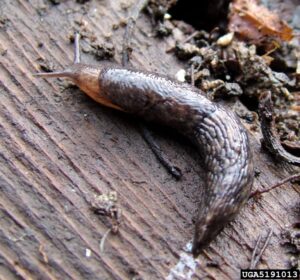Got Slugs?
go.ncsu.edu/readext?958651
en Español / em Português
El inglés es el idioma de control de esta página. En la medida en que haya algún conflicto entre la traducción al inglés y la traducción, el inglés prevalece.
Al hacer clic en el enlace de traducción se activa un servicio de traducción gratuito para convertir la página al español. Al igual que con cualquier traducción por Internet, la conversión no es sensible al contexto y puede que no traduzca el texto en su significado original. NC State Extension no garantiza la exactitud del texto traducido. Por favor, tenga en cuenta que algunas aplicaciones y/o servicios pueden no funcionar como se espera cuando se traducen.
Português
Inglês é o idioma de controle desta página. Na medida que haja algum conflito entre o texto original em Inglês e a tradução, o Inglês prevalece.
Ao clicar no link de tradução, um serviço gratuito de tradução será ativado para converter a página para o Português. Como em qualquer tradução pela internet, a conversão não é sensivel ao contexto e pode não ocorrer a tradução para o significado orginal. O serviço de Extensão da Carolina do Norte (NC State Extension) não garante a exatidão do texto traduzido. Por favor, observe que algumas funções ou serviços podem não funcionar como esperado após a tradução.
English
English is the controlling language of this page. To the extent there is any conflict between the English text and the translation, English controls.
Clicking on the translation link activates a free translation service to convert the page to Spanish. As with any Internet translation, the conversion is not context-sensitive and may not translate the text to its original meaning. NC State Extension does not guarantee the accuracy of the translated text. Please note that some applications and/or services may not function as expected when translated.
Collapse ▲“What’s eating my hostas?” The caller said, “I come out in the morning and there are these holes in the leaves of my plants!” While there are many pests, including deer, that can be eating your plants, there are only a couple that will eat and then be gone. Often times you never even see them, these nocturnal pests are slugs. They eat every kind of plant from garden vegetables to strawberries to ornamental plants and even trees! They hide during the day only to come out and forage at night while it is cool and damp.

Gray Garden Slug found beneath a rotten planter. Slugs like to hide during the day under leaves, wood, or even mulch. Cheryl Moorehead, Bugwood.org
The damage caused by slugs is typically irregular in size and shape. They are gone without a trace by first light but a good investigator can find their trail, slugs leave behind a white residue everywhere they go.
Sanitation is the best cultural control. Clean out any hiding places such as decaying wood, rocks, or bricks. Anywhere that is moist and dark during the day where they are able to retreat from the hot sun. Open your garden up so that both sunlight and air are allowed to penetrate. Do this by cleaning up plants or removing overcrowding issues with too many plants. Clean up any decaying plant materials, weeds, or grass clippings. These materials serve as food sources.
There are some DIY baits that you can use such as a container full of stale beer or yeast and water. Fill a shallow container with at least a ½ inch of beer and then set out in the garden or ornamental bed. Burying the container to be flush with soil level can be more effective. This will attract the slugs and then they will drown in the container. To trap slugs in the garden, place a board in the garden to serve as a hiding place. Check the trap every morning and remove the slugs. You can scrape them into a bucket of soapy water if you would rather not handle them.
There are also some commercial products that are available. Remember to always follow the label on any pesticide, the label is the law. One such product, suggested in the Southeastern Vegetable Crop Handbook is an Iron Phosphate bait. These can be found in products such as Sluggo. This is an OMRI approved product and can
therefore be used on organic certified vegetables and/or ornamental plants. OMRI is the Organic Materials Review Institute, they certify products that meet the criteria and can be used for USDA certified organic production. OMRI listed products can be found on the OMRI website. More information on vegetables can be found in the 2023 Southeastern U.S. Vegetable Crop Handbook.
NC State Extension provides unbiased, research-based, University information to you the consumer or producer. If you have not visited your local N.C. Cooperative Extension center, you may be pleasantly surprised by all of the information, workshops, and programming we offer!
We will have a fall veggie sale on Saturday, September 16th from 9:00-11:00, call our office or look on the Extension Master Gardeners℠ of Beaufort County Facebook page for more information.
If you are having an issue in your home garden or landscape, send your questions to Gene Fox, Consumer Horticulture Agent with the North Carolina Cooperative Extension Service. Please email Gene at gene_fox@ncsu.edu or call at (252)946-0111. Learn more on Facebook at the Beaufort County Master Gardener page or visit the Extension center located at 155 Airport Road in Washington, NC!



